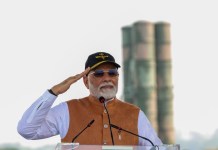Dr. Jawahar Ticku has worked on Cancer Treatment across various cities, including Delhi, Srinagar, London, Riyadh, and Dubai, and believes that the approach to Cancer Treatment has to be patient-friendly (rather than pocket-friendly) and shares why traditional cancer treatment needs to be blended with a customized approach.
Despite developing the best gadgets for early diagnosis of Cancer, investing millions of dollars in the comprehensive treatment of Cancer patients, using state-of-the-art techniques in surgery and surgical equipment, and discovering novel drugs and biological agents, Dr. Jawahar Ticku says no successful outcome for Cancer Treatment has been achieved so far, which guarantees the survival of Cancer Patients.
Seeing the poor results in Cancer Treatment and management, even in the best of the hospitals across the globe, my mind has deviated towards some additional treatment plans, adds Dr Jawahar Ticku
The present concept from different literature is that cancer is not a disease but a symptom of the disease. There is an overgrowth of tissues, the development of lumps in the body, or the enlargement of lymph nodes.
These are believed to be defensive in character, protecting the body, and once removed or killed by chemotherapy or radiotherapy, we remove the defense system of the body, and there is a progression of the disease, leading to an early death.
The second concept is that cancer is not a disease but a symptom caused by a lack of vitamin B-17 in the body. Vitamin B-17 is also known as amygdalin and is found in different roots, herbs, vegetables, seeds, and fruits.
When its level is restored in the body, cancer has the potential to disappear, and there is no need for surgery, radiotherapy, or chemotherapy (even though different researchers think differently, and Google may not completely agree)
Though Dr Ticku says he does not agree with it completely, the concept given by leading researchers and scholars must have some relevance.
Hence, he decided to combine this concept with conventional treatment methods, using lower doses of chemotherapy, lower doses of radiotherapy, and minimal surgery. This has given Dr Ticku encouraging results, and he was able to drastically prolong the lives of Cancer Patients while ensuring normal lifestyles.
Cancer Treatment: Key Recommendations
Dr. Jawahar Ticku recommends that patients seek the advice of oncologists who have the experience and vision to undertake such a combined approach to Cancer treatment.
Dr. Ticku also suggests his fellow Cancer Specialists to adopt a patient-friendly approach rather than a pocket-friendly approach (another reason why cancer treatment goes completely wrong).
There are more best practices in the management and treatment of Cancer, but we only adopt those approaches after examining the patients and analyzing the condition. Our ultimate aim is very clear: drastically prolong the lives of patients and ensure a normal lifestyle.
Finally, Dr. Jawahar Ticku says he has observed that all these combined modalities of cancer treatment have better outcomes, as they potentiate the effect of one another, require lower doses of drugs with moderate or negative side effects, and patients develop endurance to tolerance to treatment.
Remember, lavish hospitals with mesmerizing infrastructure cannot treat Cancer.
Dr Jawahar Ticku can be contacted at drticku@gmail.com
Cancer Treatment via Immunotherapy: NEWS
For the revolutionary method of Cancer Treatment via Immunotherapy, American James Allison and Japanese Tasuku Honjo were awarded Nobel Prize for the use of T cells. “The epochal discoveries of these two laureates have become a turning point in our fight against cancer,” the Nobel Committee’s decision says. Developed by Allison and Honjo, the Cancer treatment techniques “radically changed the outcome for some groups of patients with advanced cancer.”
Cancer Treatment: The New Approach
Usually, our immune system independently looks for mutated cells in the body and destroys them, preventing them from multiplying. However, cancer cells have found a way to bypass this natural defence, which allows tumours to grow rapidly.
Many cancers do this by activating a mechanism that usually “soothes” or “brakes” immune cells after an attack. So in a healthy body, the strength and duration of the immune response is regulated.
Allison and Honjo learned to “deceive” cancer cells and prevent them from blocking the immune response. This made a real revolution in therapy and formed the basis for a whole new class of drugs.
So far, these medicines have many side effects, but they have proven effective in combating oncology. Sometimes it is possible to cure even patients at a late stage of cancer, who were previously considered incurable.
Fight Against Cancer
The fact that for the fight against cancer can mobilize the immunity of the patients themselves, scientists first thought about more than 100 years ago. However, it was only in the 1990s that a real breakthrough was made in this area.
American James Allison discovered the so-called immune control points (ICT), a natural mechanism that inhibits our immunity by “calming” the T lymphocytes responsible for recognizing and destroying foreign and mutated cells.
If this mechanism is broken, then the body begins to destroy itself, switching to the destruction of healthy tissues. For example, it occurs in autoimmune diseases. Several groups of scientists at once seized this prospect: “repair of brakes” (that is, setting up the normal operation of ICT) promised a breakthrough in the treatment of type I diabetes, rheumatoid arthritis, multiple sclerosis and a host of other diseases.
However, Allison turned to exactly the opposite. He tried to disable this natural braking mechanism in patients with mouse cancer – and achieved surprising results. Tumor cells could no longer hide from immunity, and the body struggled with cancer much more effectively.
In parallel, in 1992, Tasuku Honjo opened another type of ICT – working on the same principle but in a slightly different way. Based on his discovery, the Japanese professor also developed several methods of immunotherapy. Despite the rather strong side effects, blocking ICT drugs have already proved effective in fighting lung, kidney, lymphoma and melanoma.
“Ten years ago, metastasizing melanoma was practically incurable, and now, thanks to the work of Allison and Honjo, the patients have real hope.” More than a third of patients show long-term improvements as a result of immunotherapy, and some even manage to get completely cured.




